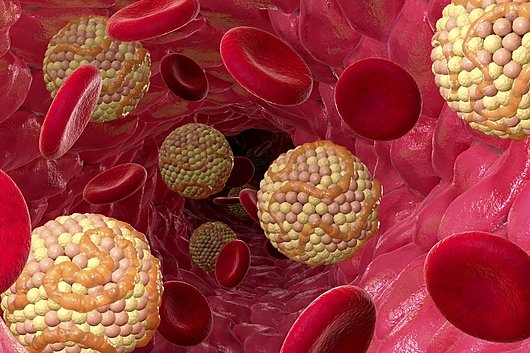Cholesterol plays a major role in the development of heart disease by contributing to the buildup of plaque in arteries. It is a waxy, fat-like substance found in every cell of the body and supports various biological functions. While your liver produces all the cholesterol your body needs to function properly, additional cholesterol is also absorbed from foods such as meat, eggs, and cheese. Consuming too much dietary cholesterol can raise the level of cholesterol in your blood, increasing your risk for cardiovascular problems.
The Role of High Cholesterol in Heart Disease
Too much LDL in your blood can damage your arteries by sticking to the artery walls and forming plaque. This buildup narrows the arteries and makes it more difficult for blood to flow freely. As a result, the heart must work harder to pump blood throughout the body. Over time, the growing plaques reduce the oxygen supply to the heart, which can lead to chest pain, heart disease, or even heart attacks.
If an artery becomes completely blocked, blood flow stops and complications can arise. Blockages in the arteries that lead to the brain can also result in strokes. Sometimes, plaques rupture and trigger the formation of blood clots that block blood flow suddenly. This disruption in circulation can have serious, life-threatening consequences, depending on the location and extent of the blockage.
Factors That Raise Cholesterol Levels
Several lifestyle habits and health issues can raise cholesterol levels in the body. Eating foods high in saturated or trans fats, such as fried items, red meat, and baked goods, increases LDL cholesterol. A lack of physical activity can also contribute to high LDL levels. Regular exercise helps raise HDL cholesterol, lower LDL, and supports weight control.
Being overweight makes it more difficult for your body to manage cholesterol levels effectively. Smoking further complicates heart health by lowering HDL and damaging artery walls; even secondhand smoke can be harmful. Genetics also influence cholesterol, as some people inherit genes that cause high LDL from birth. Additionally, conditions like diabetes, obesity, and thyroid disorders can raise cholesterol by disrupting how your body processes fats.
Ways to Lower Cholesterol Safely
You can reduce your cholesterol with a few easy lifestyle adjustments. Focus on consuming more fruits, vegetables, whole grains, and lean proteins. To support heart health, cut back on processed foods, fried items, and sugary drinks. Regular activities like walking, biking, or swimming can also make a significant difference.
Take Action for Your Heart Health
High cholesterol can silently damage your body and increase the risk of heart disease. Regular blood tests help track your cholesterol levels and detect any issues early. By staying proactive and monitoring your health, you can take control of your heart’s future. Work closely with your doctor to develop a personalized plan tailored to your needs.
Small changes in your daily routine can make a big difference. Eating well, staying active, and avoiding smoking are all helpful steps toward improving heart health. Each positive choice helps protect your heart and reduce the risk of complications. Stay committed, and your heart will thank you.
- mylovelyfurryfriend discover expert tips on dog health
- Infectious Diseases Updates – Stay Informed, Stay Protected!
- Wegovy For Weight Loss – A Breakthrough in Managing Obesity!
- Emergency Medicine Forum – A Hub for Fast-Paced Knowledge, Support & Updates!
- Pediatrics Discussions – Insights, Challenges, and Expert Advice for Better Child Health!





Leave a Reply